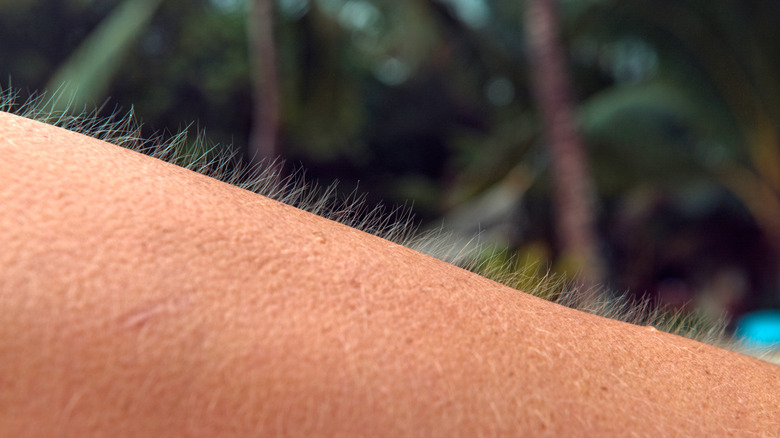The Real Reason Your Hair Stands Up When You Get Goosebumps
Whether it's because of a chilly day or because you're feeling a bit spooked, you have probably experienced the hair-raising phenomenon of goosebumps. You may have even noticed the same effect taking place when your dog gets protective or when you encounter an animal in the wild.
Those raised bumps on our skin are actually a trait from our ancestors, showcasing the triggering of our fight-or-flight response (via Scientific American). But why does your hair physically stand up when those goosebumps arrive? Researchers say it's because each little bump is connected to hair follicle muscles that get triggered by adrenaline, which contracts the muscle and forces the hair up.
You may be wondering why you sometimes get goosebumps when you're not scared — or even cold for that matter. As it turns out, it's not just fear or cold that can prompt goosebumps. It can also be an emotional reaction to a specific situation like a wedding or even while just listening to music, according to Scientific American.
Study finds goosebumps can be linked to hair growth
Scientists say goosebumps may also have links to hair growth. A study conducted by Harvard University researchers found that the cells responsible for goosebumps also regulate the stem cells that stimulate hair growth (via The Harvard Gazette). In the short-term, this means that these cells cause hair to stand up on goosebumps temporarily, but in the long-term, that they may also cause new hair to emerge.
"It's a two-layer response: goosebumps are a quick way to provide some sort of relief in the short term. But when the cold lasts, this becomes a nice mechanism for the stem cells to know it's maybe time to regenerate new hair coat," states postdoctoral fellow and co-first study author Yulia Shwartz.
It may not make us humans look as intimidating as a wild animal, but our hair standing on end when we get goosebumps is the same idea. So the next time it happens to you, you'll know your body is reacting to an emotional or environmental trigger.

